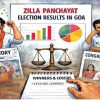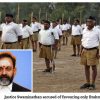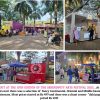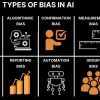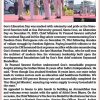Goa is abuzz with excitement as vintage bike and car owners, users, collectors and fans are decking […]
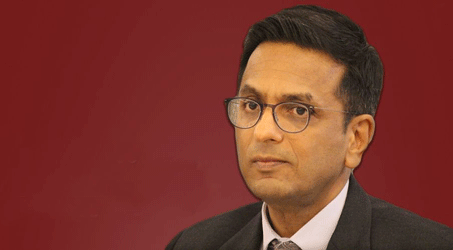
ENSURE PRESS FREEDOM- CHANDRACHUD
INFOCUS, Sep 04- Sep 10, 2021 September 3, 2021OUTSTANDING: Justice Chandrachud, who retired recently from Supreme Court, was a senior most judge and has been involved in many landmark judgement, particularly in the area of human rights.
Justice Chandrachud delivering the MC Chagla lecture stressed that democracy needs the power of truth to survive. That it is the duty of every citizen to uphold the truth.
Democracy needs the power of truth to survive, and as such one can consider “speaking truth to power” as a right as well as the duty of every citizen in a democracy, Supreme Court judge Justice D Y Chandrachud said on Saturday. Asserting that democracy and truth go hand in hand, Chandrachud, however, quoted philosopher Hannah Arendt, to say that “totalitarian governments constantly rely on falsehood in order to establish dominance”.
“Similarly, truth is important in modern democracies which have been described as ‘spaces of reason’, since any decision must be backed by adequate reasons and because a reason which is based upon a falsehood would be no reason at all,” he said while addressing the sixth Justice MC Chagla Memorial Lecture on the topic ‘Speaking Truth to Power: Citizens and the Law’. Justice Chandrachud emphasised that even in early republics, which served as precursors to democracies, the truth was considered crucial in order to ensure the ethos of transparency and openness in the way of functioning.
He said truth is also important to instil a sense of public trust in democracies, that the officials in charge are committed to finding the “truth” and acting in accordance with it. “Hence, it is no surprise that the national motto of India after its independence has been ‘Satyamev Jayate’ or ‘Truth Shall Prevail’,” he said, adding, “A state does not seek to rectify merely mischiefs that are grounded in scientific truths but also those grounded in moral truths”. Defined in ancient Greek tradition is ‘parrhesia’ which refers to an act by a speaker to use the truth to criticise someone more powerful than them, the Supreme Court judge said. In India, it would be akin to Mahatma Gandhi’s philosophy of ‘satyagraha’, where truth is used as a form of non-violent resistance to those in power. As such, speaking truth to power aims to wield the power of truth against the powerful, be it an imperial power or even an all-powerful state, he said.
“Crucially, the assumption is that the act of speaking the truth will counteract power and obviate a predisposition towards tyranny.” “Hence, it is not difficult for one to understand why democracy and truth go hand in hand. Democracy needs the power of truth to survive. As such, one can consider speaking truth to power as a right every citizen must have in a democracy, but equally as also the duty of every citizen,” Justice Chandrachud said. In his nearly 45-minutes-long lecture addressing students of law universities, colleges and judges, Justice Chandrachud said, at the outset then it is important to consider why truth is so important to democracy, which is the form of governance adopted in order to prevent tyranny of the few. “Truth also plays an important role in creating a shared public memory upon which the foundations of a nation can be built in the future. It is because of this reason that many countries opt to establish Truth Commissions immediately upon gaining independence from a totalitarian regime or after coming out of a period fraught with human rights violations,” he said. Referring to a case which he is hearing, Justice Chandrachud said in a different context, this role can also be played by courts that have the ability to document information from all the parties involved after due process has been followed.
“In the suo motu cognizance of the COVID-19 pandemic taken by our Supreme Court, we have acknowledged this very role in the context of the pandemic.” “The relationship that truth shares with democracy is that of both a sword and a shield and the scope for extensive deliberation, particularly in the age of social media, exposes multiple truths so much so that it seems like we live in an ‘age of lies’, and that shakes the very foundation of a democracy,” Justice Chandrachud said. “Citizens should arrive at a consensus on at least the basic facts that are backed by both science and society to form collective decisions. Hence, if deliberations are censored by the state or if we either subconsciously or deliberately censor them, we would discern just one truth — one that is not challenged by us,” he added. Pointing out that pre-legislative consultative process is an apt instance where deliberation between individuals has brought about impactful change, Justice Chandrachud referred to the draft Bill for the Kerala Police Act, 2011, which was published on the website of the state police inviting feedback and suggestions.
“When the Bill was introduced in the House, it was referred to the select committee and it conducted a district-wide meeting. “Around 400 to 500 people attended these meetings and the necessary impact of such an extensive consultative process was the suggestion of 790 amendments to the draft Bill after nearly four hours of extensive debate. Around 240 of those suggested amendments, most of which were centred on the public feedback, were ultimately accepted,” he said. Justice Chandrachud further stated that long before the decision of the Supreme Court in Navtej Singh Johar case which decriminalised homosexuality, and long before a miniscule population of our country normalised homosexuality, Denmark had passed the Registered Partnership Act of 1989 which legalised same-sex marriage, subject to very few exceptions.
MUST STRIVE TO ENSURE PRESS
He said that to counter fake news and lies, citizens must strive to ensure the press is free from any influence — political or economic — and would provide information in an unbiased manner. One cannot only rely on the state to determine the truth, he said addressing students and faculty members of law colleges and universities, and judges at the sixth M C Chagla Memorial lecture. Even opinions by experts such as scientists, statisticians, researchers and economists may not always be true because they may not have political affiliation but their claims are also subject to manipulation due to ideological affinity, receipt of financial aids or personal malice, Justice Chandrachud said.
“As such, all policies of the state can be assumed to have been formed on their basis of what the truth of our society is. However, this by no means leads to the conclusion that the states cannot indulge in falsehood for political reasons, even in democracies,” he said, adding the “role of the US in the Vietnam War did not see the daylight until the Pentagon Papers were published”. In the context of the pandemic, “we see that there is an increasing trend of countries across the world who are trying to manipulate data on the COVID-19 infection rate and deaths”, he said.
“The first thing to do is to strengthen our public institutions. As citizens, we must strive to ensure that we have a press that is free from influence of any kind, political or economic, which will provide us information in an unbiased manner,” the Supreme Court judge said.
He said that it is undeniable that the phenomenon of fake news is on the rise. A pertinent example of this is that the WHO recently termed the current COVID-19 pandemic as also being an infodemic, due to the overabundance of misinformation online, he said.
Justice Chandrachud added, Fake news or false information is not a new phenomenon, having been in existence for as long as print media has existed. The rapid advancement in technology and the spread of internet access has definitely exacerbated this problem. He also streesed the need to not only acknowledge the plurality of opinions in a country as diverse as India, but to celebrate it. “This allows for more breathing space for all opinions, and leaves room open for actual deliberation, he said.
Justice Chandrachud said that it is often noted that even on the internet, the largest portion of the blame is often laid at the door of large corporations like Facebook and Twitter. Part of the problem is that while these social media platforms allow users to create their own networks and communities, it also leads to homogeneity within those networks, he said.
Coutersy:www.news18.com



